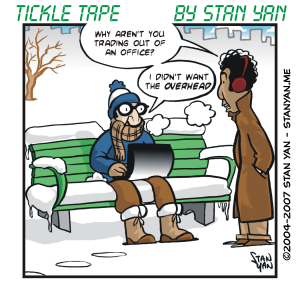Trading is much like learning a risky sport, such as motocross, skateboarding, or skiing. In these sports, you play by yourself and try to stretch the limits. But if you try to perform beyond your skill level, you’ll get hurt. If you try to make a jump before you even know how to manoeuvre around basic obstacles, in all likelihood, you’ll fail when you make an attempt. It’s better to take it slowly. Build up your skills through practice and preparation before trying something too difficult.
This is a commonsense approach, but when it comes to trading, few follow it. It’s as if they are thinking, “That doesn’t look very hard. What can go wrong?” A lot can go wrong, however. If you risk too much money without taking proper precautions, you can take a substantial hit to your account, and be unable to recover. As with many things in life, it is wise to take slow, easy steps before taking a big risk and falling hard.
Seasoned traders take risks. When they see a rare opportunity, they capitalize on it. They may take a big risk in order to make a big profit. There are two reasons they can use this approach. First, because of their vast experience, they are able to change their plan midway through the trade should an unexpected, adverse event occur. Second, in the event that they do lose a big part of their account, they have sufficient skills to work steadily to recover from a major setback. Novice traders, in contrast, don’t have the experience or skills to take big risks. If they try something too risky, they won’t be able to recover. It is wise to control risk, carefully plan a trade, and follow the plan.
Trading is stressful, and under stressful conditions, it is difficult to perform at one’s peak. Novice traders, especially, have trouble managing the uncertainty of the markets and trading successfully. That is why it is vital to take precautions to make sure that one can make trade after trade without giving in to stress and emotion of the markets. And the best way to do that is to take small steps. Make small trades and gain experience with the markets. Don’t overtrade or move out of your comfort zone until you are ready. Wait until you have the requisite skills. There’s no reason to take unnecessary risks. If you trade small, work out a plan and follow it, over the long run, you will gain experience with the markets, hone your trading skills, and eventually achieve lasting profitability.


